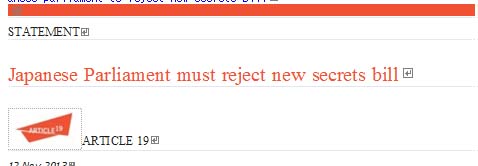日本の議会は、特定秘密保護法案を否決すべきである HOME
ロンドンを拠点として、世界の言論の自由状況の監視と、ジャーナリスト活動のサポートをしている世界的人権団体NPO「アーティクル19」が、日本の特別秘密保護法案に対する懸念の声明を出しました。以下、全文翻訳例と原文です(翻訳:別府三奈子)。
・・・・・・・・・・・・・・・・・・・・・・・・・・・・・・・・・・・・・・・・・・・・・・・・・・・・・・・・・・・・・・・・・・・・・・・・・・・・・・・・・・・・
声明(タイトル)
ARTICLE19:「日本の議会は、特定秘密保護法案を否決すべきである」
2013年11月12日
(本文)
表現の自由のための国際人権団体であるARTICLE19は、日本の国会に対して、現在審議中の特定秘密保護法案を否決するよう、強く求める。当法案は表現の自由と情報にアクセスする権利(知る権利)を保障する国際法の基準に反している。
10月に内閣によって提出され、今秋政府案が審議入りしたこの法案は、近年、言論の自由を守る国際法に抵触するいくつかの条項が含まれている。
・秘匿される情報の定義が極端に曖昧である。防衛、外交に関するあらゆる情報のほか、「特定有害活動」や「テロリズム」に関するいかなる情報にも適用可能であり、政府が環境災害、人権侵害、汚職、国際法によって公開することとなっている他の分野の情報をも隠蔽することが可能になる。
・情報が特定秘密にされる期限は5年ごとで、繰り返し延長することでその期間を無制限に延長することができる。
・内部告発は公益が目的であっても、上限10年の懲役を受ける。
・ジャーナリストが特定された情報を報道した場合、それが公益に資することを証明しても起訴されうる。
・第21条:報道の自由に関する規定は、極めて弱いもので、当局へ要望するにとどまる。
*「不当」な人権侵害を避けることを求められてはいるが、何が「不当」かが不明である。
*報道または取材の自由に「十分に配慮」することを求めているが、それが何を意味するのか具体的な定義がない。
*「専ら公益を図る目的を有する」ものを合法としているが、「公益」の定義は政府自身が行うものとされている。
当法案は、日本政府が防げるはずの死を招いた福島原子力発電所の甚大な事故に関して、十分かつ適時の情報提供に失敗したのちに作成された。日本に関する2013年の報告では、国連の健康に関する国連特別報告者が、この災害に関する人びとの公情報へのアクセスについて、多くの妨害を当局が強要していると非難している。ARTICLE19は、当法案が可決されれば、政府にとって不都合な情報が非公開にされる傾向が一層強まることと確信している。
■ARTICLE19は日本の国会に対し、当法案を否決し、日本が国際法を忠実に遵守するよう強く求める。
* 秘密として特定される情報の範囲は厳しく制限されるべきであり、その適用については、合法的な国家機密を保全するときのみとする。すなわち、明白な被害を起こす危険性が現実的に立証できるものに限り、その期間を限定して適用すべきである。
*秘密に特定されている情報であっても、公開することが公益に資する場合は、公開されなければならない。
*公益に資する情報を公表する内部告発者は、保護されなければならない。
*ジャーナリストは、秘密に特定されている情報であっても、公益に資するいかなる情報の公表については責任を問われてはならない。
*「公益」とは、公の議論や説明責任に実質的に貢献するあらゆるものというように、幅広く定義されるものである。
→更なる情報のお問い合わせ先
David Banisar(上級法律顧問 アーティクル19)
+44 207 324 2518 banisar@article19.org
・・・・・・・・・・・・・・・・・・・・・・・・・・・・・・・・・・・・・・・・・
(訳注)
ARTICLE19は表現の自由及び知る権利の保護を専門とする国際人権団体である。1987年に設立され、本部をロンドンに置く。
日本語での問い合わせ先: 藤田早苗(sfujit@essex.ac.uk)
高橋宗瑠(humanrights.praeger@gmail.com/電話+972 54 817 4003)
(以下、原文のコピー)
http://www.article19.org/resources.php/resource/37346/en/article-19-urges-japanese-parliament-to-reject-new-secrets-bill

ARTICLE 19 urges the Japanese National Diet (Japanese Parliament) to reject the pending Special Secret Protection Bill. The bill violates international standards on freedom of expression and the right to information.
Approved by the Cabinet in October and being heard by the Diet this week,
the bill currently includes several provisions that violate international
law protecting freedom of expression:
・ The definition of protected information is overly vague. It is being
applied to anything relating to defence, diplomacy, “harmful activities”
and “terrorism” and would allow the authorities to hide information about
environmental hazards, human rights abuses, corruption and other areas
protected by international law.
・ Information could be classified as a ‘special secret’ indefinitely by allowing it to be repeatedly classified every five years.
・ Whistleblowers face up to ten years imprisonment with no possibility
of any public interest defence.
・ Journalists can be prosecuted for revealing classified information even
if they demonstrate that it is in the public interest.
・ The safeguards proposed in Article 21 are extremely weak. They call on the authorities only:
- not to violate human rights “unreasonably”,
- to “fully take into account” freedom of expression without defining what that means,
- to only consider releases which ?“aim to benefit public interest”
as legal something which the authorities themselves would decide.
This bill comes in the wake of the Japanese authorities’ failure to release
full and timely information about the tragic events at the Fukushima Nuclear
Reactor, which resulted in preventable deaths. In his 2013 report on Japan,
the UN Special Rapporteur on Health was critical of the numerous barriers
that the authorities imposed on the public’s access to information about
the disaster. ARTICLE 19 believes that this bill would further encourage
the authorities to keep vital and potentially embarrassing information
private.
ARTICLE 19 urges the Diet to reject the current bill and ensure that Japanese law is consistent with international law which requires that:
・ Information deemed secret is strictly limited and used only to protect a legitimate national security interest for a limited period when there is a real and identifiable risk of significant harm,
・ Information is made public when it is in the public interest to do so,
even if it is classified,
・ Whistleblowers are protected from releasing information in the public
interest,
・ Journalists are not held liable for publishing any information in the public interest, even if it is classified,
・ ‘Public interest’ is broadly defined as anything that substantially
contributes to public debate and accountability.
More information
For more information or media interviews in English, please contact David Banisar, Senior Legal Counsel, ARTICLE 19, ?+ 44 207 324 2518, banisar@article19.org
・ The Johannesburg Principles on National Security, Freedom of Expression and Access to Information
・ The Global Principles on National Security and the Right to Information (The Tshwane Principles)
・ Report of the Special Rapporteur on the promotion and protection of
the right to freedom of opinion and expression, A/68/362? (2013)
・ Report of the Special Rapporteur on the right of everyone to the enjoyment of the highest attainable standard of physical and mental health,A/HRC/23/41/Add.3 (2013)
ARTICLE 19 Free Word Centre, 60 Farringdon Road, London, EC1R 3GA T +44 20 7324 2500
F +44 20 7490 0566 E info@article19.org
c 2013 Registered charity number 327421 | A company limited by guarantee, registered in England and Wales no. 2097222
- See more at: http://www.article19.org/re